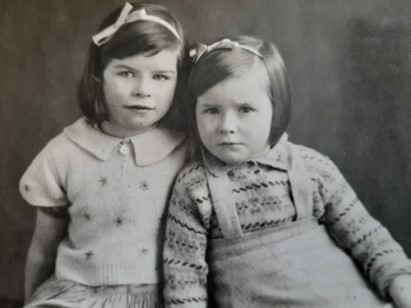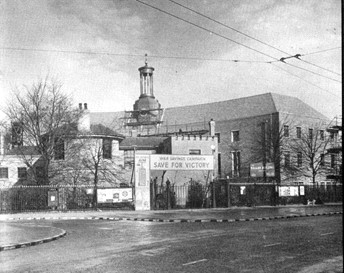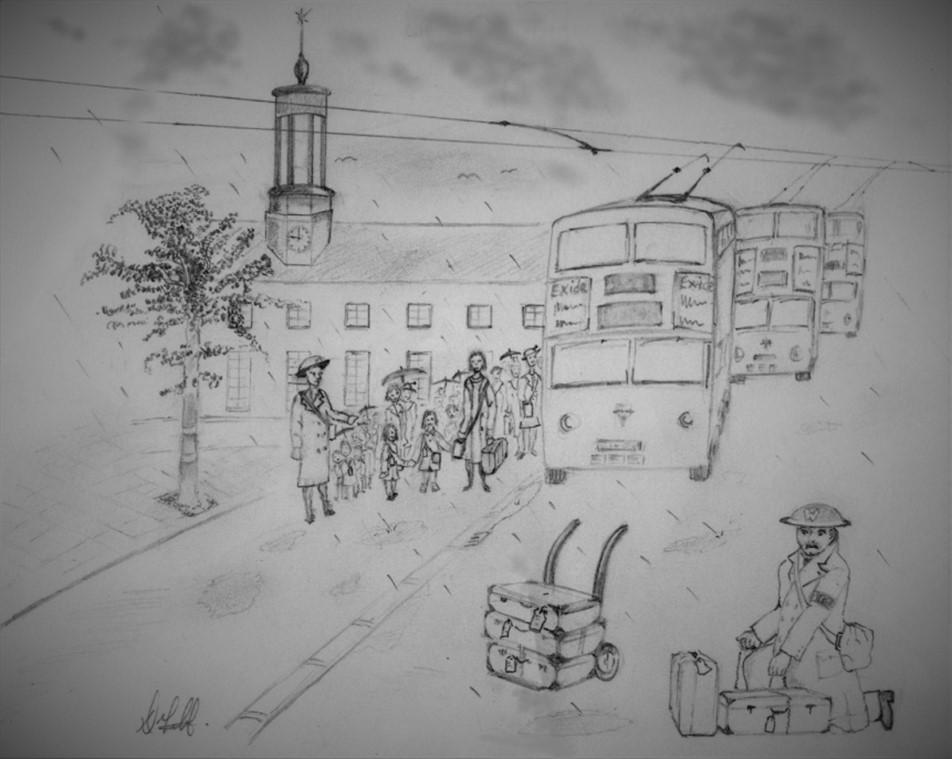Evacuation
Due to the German rockets, the borough of North Finchley and Friern Barnet began planning the evacuation of children in the area, and Mothers would be allowed to go too if they wished. Mum decided we[24] would go together along with quite a few families in the street.
After all the usual arrangements were made, the day arrived. Although it poured with rain—a miserable grey day—it was one of excitement as we assembled with our luggage at the Friern Barnet Town Hall.[25][25a] Uncle Bill, my Grandma Lawrence’s brother, was there in his air raid warden uniform, ready to help organise the throng of mothers and children. Each of us had to have a label pinned on our coats with name, address, and destination on it.
‘Make sure you have your gas masks,’ the WVS ladies called.
A line of trolleybuses stood outside the Town Hall. One by one, checked and doubled checked, we were loaded on with the luggage, then took our seats on the top deck. Mum’s friend Mrs Fuller had brought sweets and comics for us and her children, bless her. I remember it like it was yesterday, and I know we enjoyed the experience. The trolleybuses began moving down Friern Barnet Road towards the Railway Hotel, then, after the railway bridge went right on towards Bounds Green, Wood Green, Holloway and finally to King’s Cross Station.
The rain was still pouring as we entered the station and we hung onto Mum, afraid of getting lost in the crowds of people. Helping hands guided us onto the train and it began moving soon enough. We had travelled all day it seemed, the journey broken up only by a lunch of sandwiches, milk and biscuits. We did enjoy the experience.
On arrival at our destination, the seaside town of Scarborough, Yorkshire, we were transferred to buses and driven to a girls’ school which would be our home for the next two or three days. The residents of the town were not too happy about having Londoners hoisted on them, and only a few came forward with offers of places to stay. They had heard that London people were dirty and had head-lice, so you could not blame them for being wary of us. True, some families were poor and hard-up, but those of us in our group were clean and respectable.
The police took some of the evacuees in one of their own cars, making enquiries, asking how many rooms were to spare, and please would they take some in? There was no idea for how long this arrangement was expected to last, because as far as anyone knew, the war could have gone on longer than it did.
A pleasant semi-detached house was found for us, although the lady living there was not too keen on taking us. She had a kitchen maid who came in each day to help around the house and her husband was in the Army. ‘Children should be kept in their place’, was her opinion. My sister found and ate some green apples from the garden and suffered from colic. From that point we seemed to get one thing after another.
The weather was bad, Mum felt home sick and there was an argument with a council official—which ended in tears—resulting in preparations soon being made so we could return to London. We only stayed in Scarborough for a few weeks. The rail trip home meant changing trains at Doncaster Station, which at the time was full of troops. On the last train home, some Canadian soldiers gave us their seats and were kind enough to share their sandwiches with us.
Arriving back in London, we took a taxi from King’s Cross to Grandma Lawrence’s where we stayed the night, going home to Goldsmith Road the next day. One detail that sticks in my mind is that when we got back to London, at some point, I lost a red beret I had been wearing.




Leave a Reply